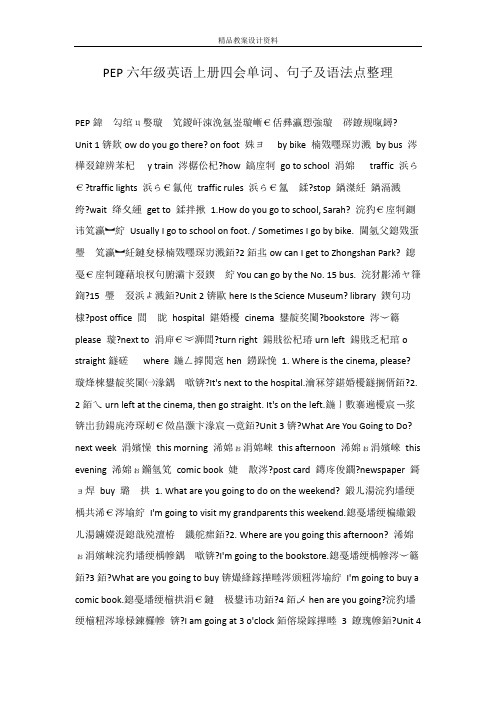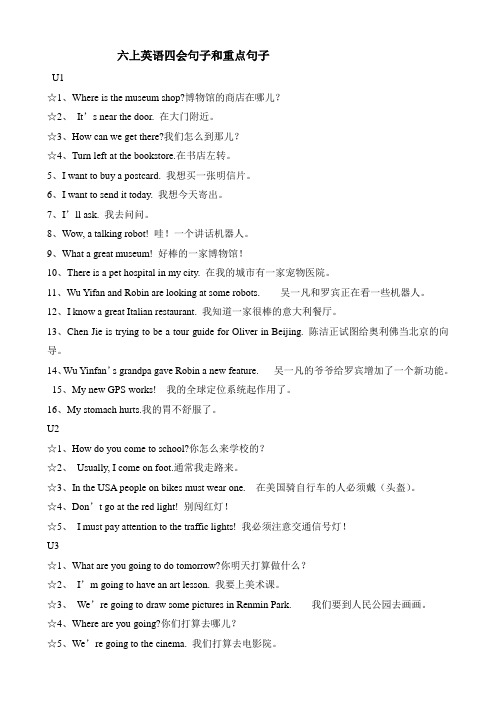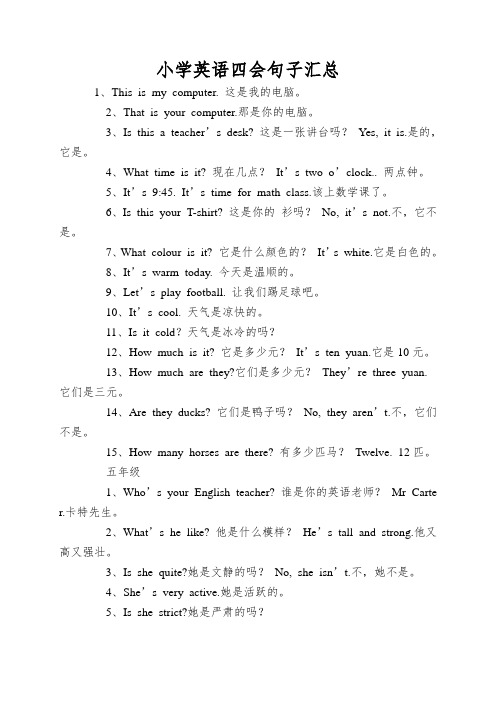六年级英语上四会句子,短语
小学英语四会句子汇总(带翻译)[1]
![小学英语四会句子汇总(带翻译)[1]](https://img.taocdn.com/s3/m/8faf8dce8bd63186bcebbc73.png)
小学英语四会句子汇总1. This is my computer. 这是我的电脑。
2. That is your computer. 那是你的电脑。
3. Is this a teacher’s desk? Yes, it is.那是讲桌吗?是的,它是。
4. What time is it? 现在几点了?5. It’s two o’clock.现在两点。
6. It’s 9:45. 现在九点四十五。
7. It’s time for math class.现在该上数学课了。
8. Is this your T-shirt? No, i t’s not.这是你的T恤吗?不,它不是。
9. What colour is it? It’s white.它是什么颜色的?它是白色的。
10. It’s warm today. 今天很暖和。
11. Let’s play football.让我们来踢足球。
12. It’s cool.天气凉爽。
13. Is it cold?天气冷吗?14. How much is it? It’s ten yuan.它多少钱?十元。
15. How much are they? They’re thre e yuan. 它们多少钱?三元。
16. Are they ducks? No, they aren’t.它们是鸭子吗?不,他们不是。
17. How many horses are there? Twelve. 有多少匹马?十二匹。
18. Who’s your English teacher? Mr Carter.谁是你的英语老师?卡特先生。
19. What’s he like? He’s tall and strong.他长什么样?他又高有强壮。
20. Is she quite? No, she i sn’t. She’s very active.她文静吗?不,她非常活跃。
21. Is she strict? Yes, she is, but she’s very kind.她严格吗?是的,但是她非常和蔼。
六年级上册英语第二单元知识点

六年级上册英语第二单元知识点六年级上册英语知识点归纳Unit2: Ways to go to school一、重点单词和短语1.四会词汇:XXX乘公交车XXX,乘飞机XXX乘出租车by ship乘船by XXX乘地铁XXX乘火车by XXX骑自行车slow down慢下来stop停止wait等go走了解:by…= takea / the…例如:by bus = take a / the bus2.频率副词:(次数从多到少)always总是。
usually通常。
often经常。
sometimes有时。
never从不3.其他:pay attention to注意by ferry乘轮渡by sled滑雪橇cross the road横穿马路traffic light(s)通信号灯at home在家missed (miss的过去式)想念different不同的same相同的cross穿过lookright向右看chopsticks筷子(复数)door门look at朝……看play with和……一同玩XXX好极了2、按要求写单词:go (反义词)come。
foot(复数)feet。
child(复数)childrengood(反义词)bad坏的take带走(反义词)bring拿来slow慢的(反义词)quick/fastgo(过去式)went。
do(过去式)did。
do(第三人称单数)doesgo(第三人称单数)goes。
same相同的(反义词)different不同的miss(过去式)missedwrong毛病(反义词)right精确can(否认体式格局)can’t。
early早的(反义词)late晚的3、重点句子(一)四会句子1.--- How do you come to school?你(们)怎样来黉舍的?--- Usually。
I come on foot。
= Usually。
I walk.通常情况下,我步行来。
pep英语六年级上册Unit 3四会单词及句子

Unit 3next week 下周[nekst] [wi:k] this morning 今天上午[ðis]['mɔ:niŋ]this afternoon 今天下午[ˌɑ:ftə'nu:n]this evening 今天晚上['i:vniŋ] tonight今晚[tə'nait]tomorrow明天[tə'mɔrəu]take a trip去旅行[teik] [trɪp] read a magazine阅读杂志[ri:d] [,mægə'zi:n][ðə] [greit] [wɔ:l]go to the cinema 去看电影['sinimə] theme park 主题公园[θi:m] [pɑ:k] the Great Wall长城busy忙碌的together一起地[tə'geðə] comic book 漫画书['kɔmik] post card 明信片[post] [kɑrd]newspaper 报纸['nju:z,peipə]magazine杂志[,mægə'zi:n] dictionary词典;字典['dikʃənəri]shoe store鞋店[ʃu:] [stɔ:] buy 购买[bai]fruit stand水果摊[fru:t] [stænd]pet shop宠物商店[pet] [ʃɔp] need需要[nid]plant植物[plænt]else其他;另外[els]shop商店[ʃɔp]句子:What are you going to do on the weekend?周末你打算干什么?I’m going to visit my grandparents this weekend.这个周末我打算拜访我的祖父母。
PEP六年级英语上册四会单词、句子及语法点整理

PEP六年级英语上册四会单词、句子及语法点整理PEPц?Unit 1锛欻ow do you go there? on foot by bike 楠戣嚜琛岃溅by bus 涔y train 涔樼伀杞?how 鎬庢牱go to school traffic 浜ら€?traffic lights 浜ら€氱伅traffic rules ?stop 鍋滐紝鍋滆溅绔?wait 绛夊緟get to 鍒拌揪 1.How do you go to school, Sarah? 浣犳€庢牱鍘讳笂瀛︼紵Usually I go to school on foot. / Sometimes I go by bike. 閫氬父鎴戣蛋?2銆丠ow can I get to Zhongshan Park? 鎴You can go by the No. 15 bus. 浣犲彲浠ヤ箻鍧?15 ?Unit 2锛歐here Is the Science Museum? library 鍥句功棣?post office hospital 鍖婚櫌cinema 鐢靛奖闄?bookstore 涔﹀簵please 璇?next to 涓庘€︾浉閭?turn right 鍚戝彸杞瑃urn left 鍚戝乏杞琯o straight where 鍦ㄥ摢閲宼hen 鐒跺悗1. Where is the cinema, please??It's next to the hospital.瀹冧笌鍖婚櫌鐩搁偦銆?2. 2銆乀urn left at the cinema, then go straight. It's on the left.鍦ㄧ數褰遍櫌宸﹁浆锛岀劧鍚庣洿琛屻€傚畠灏卞湪宸﹁竟銆?Unit 3锛?What Are You Going to Do? next week 涓嬪懆this morning 浠婂ぉ涓婂崍this afternoon 浠婂ぉ涓嬪崍this evening 浠婂ぉ鏅氫笂comic book ?post card 鏄庝俊鐗?newspaper 鎶ョ焊buy 1. What are you going to do on the weekend? 鍛ㄦ湯浣犳墦绠楀共浠€涔堬紵I'm going to visit my grandparents this weekend.鎴戞墦绠楄繖鍛?2. Where are you going this afternoon? 浠婂?I'm going to the bookstore.鎴戞墦绠楀幓涔﹀簵銆?3銆?What are you going to buy锛熶綘鎵撶畻涔颁粈涔堬紵I'm going to buy a comic book.?4銆乄hen are you going?浣犳墦绠椾粈涔堟椂鍊欏幓锛?I am going at 3 o'clock銆傛垜鎵撶畻 3 鐐瑰幓銆?Unit 4锛?I Have a Pen Pal hobby 鐖卞ソride a bike--riding a bike 楠戣嚜琛岃溅dive--diving 璺虫按play the violin鈥昿laying the violin 鎷夊皬鎻愮惔make kites 鈥昺aking kites 鍒朵綔椋庣瓭collect stamps鈥昪ollecting stamps 闆嗛偖live 锟紺lives 灞呬綇teach--teaches 鏁?go--goes 鍘?watch--watches 鐪?read--reads 璇伙紝鐪?does doesn鈥檛=does not 1. What's your hobby?涔堬紵I like collecting stamps.?2銆丠e likes collecting stamps, too. ?3銆丏oes she teach math? --- Yes, she does.?Does she teach English?-- No, she doesn't.涓嶏紝濂逛笉鏁欍€?She teaches math.?Unit 5锛?What Does She Do? singer 姝屽敱瀹讹紝姝屾墜writer actor 鐢锋紨鍛?actress 濂虫紨鍛?artist TV reporter ?engineer 宸ョ▼甯?accountant policeman ?salesperson cleaner 娓呮磥宸?where 鍦ㄥ摢閲岋紝鍒板摢閲?work 宸ヤ綔 1.What does your mother do? What si your mother??She is a TV reporter.濂规槸涓€浣嶇數瑙嗗彴璁拌€呫€?2銆乄hat does your father do? 浣犵埜鐖告槸骞蹭粈涔堢殑锛烪e is an accountant.浠栨槸涓€浣嶄細璁°€?3銆乄here does she work? ?She works in a car company.濂瑰湪灏忔苯杞﹀叕鍙稿伐浣溿€?4銆丠ow does she go to work? She goes to work by bus.?Unit 6锛?The Story of Rain rain 闆?cloud 浜?sun stream 娌筹紝婧?come from 鏉ヨ嚜锛?浠庘€︽潵seed 绉嶅瓙soil 鍦熷¥sprout 鑻楋紝鑺?plant 妞嶇墿锛?should 搴then 鐒跺悗1. Where does the rain come from? --- It comes from the clouds.?2銆乄here does the cloud come from? 浜--- It comes from the vapour.?3銆乄here does the vapour come from? --- It comes from the water in the river.?4銆丠ow can the water become vapour?姘存€庢牱鍙樻垚姘磋捀姘旓紵--- The sun shines and the waterbecomes vapour.闃冲厜鐓ц€€锛屾按鍙樻垚钂告皵銆?5.銆丠ow do you do that? 浣犳€庢牱鍋氬憿? 6銆?What should you do then?鐒跺悗浣犲簲璇ュ共浠€涔堬紵鍔ㄨ瘝鍙樺寲褰㈠紡锛?鍔ㄨ瘝鐨勭幇鍦ㄥ垎璇嶏紝鐢ㄤ簬鐜板湪杩О+be(am is are)+1ng: reading flying looking cooking eating鈥?2銆佸姩璇嶆湯灏炬槸涓嶅彂闊崇殑e,鍘绘帀e,鍐嶅姞ing: take-taking come-coming ride-ridinghave-having make-making 鈥?3ing:run-running sit-sitting put-putting begin-beginning swimming鈥?渚嬶細I am reading a comic book. 鍚屾椂鍔ㄨ瘝鐜板湪鍒嗚瘝缁撴瀯杩樺彲浠ョ敤浜巐ike/enjoy I like swimming./I enjoy swimming.绉板崟鏁板舰寮忥紝鐢ㄤ簬always,often,usually,sometimes every dayО1銆佸姩璇嶆湯灏惧姞s: says asks sings answers looks makes鈥?2銆佷互s銆亁銆乧h 銆乻h缁撳熬鐨勫姩璇嶅姞es: teaches brushes鈥?3銆佷互杈呴煶瀛楁瘝+y缁撳熬鐨勶紝鍘粂鍙榠,鍐嶅姞es: fly-flies try-tries鈥?4.es锛?go-goes do-does have-has he has a book. 鐗规畩鐤戦棶鍙??璇㈤棶骞撮緞锛岀敤how old How old is Jenny? She is eleven. 璇㈤棶棰滆壊锛岀敤what colour What colour is your hair? It鈥檚black. 璇㈤棶浠锋牸锛岀敤how much How much is a stamp? 2 yuan. 璇㈤棶琛屼负鏂瑰紡锛岀敤how How do you go to school? By bus. 璇㈤棶鏁伴噺锛岀敤how many How many books do you have? I have twelve books. 璇㈤棶鏃堕棿锛岀敤when When is Teacher鈥檚Day?It鈥檚September tenth. 璇㈤棶鍏蜂綋鏃跺埢锛岀敤what time What timeis it now? It鈥檚6:30. 璇㈤棶鍦版柟锛岀敤where Where is the book? It鈥檚on the desk. 璇㈤棶浜猴紝鐢╳ho Who is she ?She is my sister. /灞?澶?..锛夛紝鐢╳hich Which season do you like ?I like summer. 璇㈤棶鑱屼笟锛岀敤what What do you do?I am a teacher. What are you?I am a teacher. 璇㈤棶鐖卞ソ锛岀敤what What is your hobby?I like swimming./My hobby is swimming. What do you like to do?I like swimming. 鏃舵€侊細1. (琛ㄧ粡甯革? 锛?锛?be鍔ㄨ瘝鐨勫彞瀛?I am a girl.(鑲? Are you a girl锛焂es,I am./No,I am not.() What is she锛?鐗规畩鐤戦棶鍙?She is a teacher./She is not a student.(鍚? 锛?锛?瀹炰箟鍔ㄨ瘝鐨勫彞瀛?A锛彞鍊熷姪鍔╁姩璇峝o I often read comic books and clean the room on Saturday.锛堣偗锛?I do not (don鈥檛) read comic books and clean the room on Sunday.(鍚? Do you often read comic books and clean the room on Saturday?Yes, I do./No,I don鈥檛.() What do you often do on Saturday?(鐗规畩鐤戦棶鍙? B:浜虹О紡锛屽湪鐤戦棶鍙ュ拰鍚﹀畾鍙ヤ腑鍔╁姩璇嶇敤does锛屽疄涔夊姩璇嶅彉涓哄師褰?She often reads comic books and clean the room on Saturday.锛堣偗锛?She does not (doesn鈥檛) read comic books and clean the room on Sunday.(鍚? Does she often read comic books and clean the room on Saturday?Yes, she does./No,she doesn鈥檛.() What does she often do on Saturday?(鐗规畩鐤戦棶鍙? 2. 為檯杩樻病鍋氾級閫氬父浼氭湁琛ㄥ皢鏉ョ殑鏃堕棿缁撴瀯锛氫汉绉?be锛坅m/is/are锛塯oing to +鍔ㄨ瘝鍘熷舰+鏃堕棿锛堣〃鎵撶畻锛?My mother is going to clean the room this weekend.(鑲? My mother is not going to clean the room this weekend.(鍚? Is your mother going to clean the room this weekend?Yes,she is ./No,she isn鈥檛.(涓) What is your mother going to do this weekend?(鐗规畩鐤戦棶鍙?3. 缁撴瀯锛氫汉绉?be锛坅m/is/are锛?鍔ㄨ瘝鍒嗚瘝缁撴瀯+(now) My uncle is making kites now.(鑲? My uncle is not making kites now.(鍚? Is your uncle is making kites now?Yes,he is./No,he isn鈥檛.( ) What is your uncle doing now?(鐗规畩鐤戦棶鍙?4. 鎯呮€佸姩璇峜an I can swim.(鑲? I can not swim.(鍚? Can you swim?Yes,I can./No,I can鈥檛.(涓€鑸) What can you do?(鐗规畩鐤戦棶鍙?。
PEP六年级英语上册四会单词、句子及语法点整理

PEP六年级英语上册四会单词、句子及语法点整理PEP六年级英语上册四会单词、句子及语法点整理Unit 1:How do you go there?步行by bike 骑自行车 by bus 乘公共汽车by train 乘火车 how 怎样 gl 上学 traffic 交通 traffic lights 交通灯 traffic rules 交通规则 stop 停,停车站 wait 等待 get to 到达1.How do you gl, Sarah? 你怎样去上学? Usually I gl/I go by bike. 通常我走路上学,有时骑自行车。
2、How can I get to Zhongshan Park? 我怎样能到达中山公园?You can go by the No. 15 bus. 你可以乘坐 15 路公交车。
Unit 2:Where Iuseum?library 图书馆邮局 hospital 医院 cinema 电影院 b书店please 请 next to 与…相邻 turn right 向右转turn left 向左转go straight直行 where 在哪里then 然后1. Wa, please? 请问电影院在哪里? It's nexal.它与医院相邻。
2. 2、Turn left aa, then go straight. It'left.在电影院左转,然后直行。
它就在左边。
Unit 3: What Are You Going to Do?next week 下周g 今天上午 this a今天下午 this evening 今天晚上 comic book 漫画书 post card 明信片 newspaper 报纸 buy 购买1. What are you going to dweekend? 周末你打算干什么? I'm going to vgrandpaweekend.我打算这周末看望我的外祖父母。
六上英语1-6四会句子和重点句子

六上英语四会句子和重点句子U1☆1、Where is the museum shop?博物馆的商店在哪儿?☆2、It’s near the door. 在大门附近。
☆3、How can we get there?我们怎么到那儿?☆4、Turn left at the bookstore.在书店左转。
5、I want to buy a postcard. 我想买一张明信片。
6、I want to send it today. 我想今天寄出。
7、I’ll ask. 我去问问。
8、Wow, a talking robot! 哇!一个讲话机器人。
9、What a great museum! 好棒的一家博物馆!10、There is a pet hospital in my city. 在我的城市有一家宠物医院。
11、Wu Yifan and Robin are looking at some robots. 吴一凡和罗宾正在看一些机器人。
12、I know a great Italian restaurant. 我知道一家很棒的意大利餐厅。
13、Chen Jie is trying to be a tour guide for Oliver in Beijing. 陈洁正试图给奥利佛当北京的向导。
14、Wu Yinfan’s grandpa gave Robin a new feature. 吴一凡的爷爷给罗宾增加了一个新功能。
15、My new GPS works! 我的全球定位系统起作用了。
16、My stomach hurts.我的胃不舒服了。
U2☆1、How do you come to school?你怎么来学校的?☆2、Usually, I come on foot.通常我走路来。
☆3、In the USA people on bikes must wear one. 在美国骑自行车的人必须戴(头盔)。
小学英语四会句子汇总

小学英语四会句子汇总1、This is my computer. 这是我的电脑。
2、That is your computer.那是你的电脑。
3、Is this a teacher’s desk? 这是一张讲台吗?Yes, it is.是的,它是。
4、What time is it? 现在几点?It’s two o’clock.. 两点钟。
5、It’s 9:45. It’s time for math class.该上数学课了。
6、Is this your T-shirt? 这是你的衫吗?No, it’s not.不,它不是。
7、What colour is it? 它是什么颜色的?It’s white.它是白色的。
8、It’s warm today. 今天是温顺的。
9、Let’s play football. 让我们踢足球吧。
10、It’s cool. 天气是凉快的。
11、Is it cold?天气是冰冷的吗?12、How much is it? 它是多少元?It’s ten yuan.它是10元。
13、How much are they?它们是多少元?They’re three yuan.它们是三元。
14、Are they ducks? 它们是鸭子吗?No, they aren’t.不,它们不是。
15、How many horses are there? 有多少匹马?Twelve. 12匹。
五年级1、Who’s your English teacher? 谁是你的英语老师?Mr Carte r.卡特先生。
2、What’s he like? 他是什么模样?He’s tall and strong.他又高又强壮。
3、Is she quite?她是文静的吗?No, she isn’t.不,她不是。
4、She’s very active.她是活跃的。
5、Is she strict?她是严肃的吗?6、Yes, she is, but she’s very kind. 是的,她是。
人教版小学英语六年级上册四会单词及句子

人教版小学英语六年级上册四会单词及句子Unit1第一单元四会单词:science museum科学博物馆post office邮局bookstore书店cinema电影院hospital医院crossing十字路口turn left向左转go straight直走turn right向右转四会句子:1—- Where is the museum shop? 博物馆的商店在哪儿? ——It’s near the door在大门附近2 --How can we get there?我们怎么到那儿?——Turn left at the bookstore到书店左转Unit2 第二单元四会单词:on foot走路by bus乘公共汽车by taxi乘出租车by plane乘飞机by subway乘地铁by ship乘船by train乘火车slow down减速stop停下wait等go走四会句子:1—— How do youcome to school?你怎么来学校的?——Usually,I come on foot通常我走路来2 In the USA people on bikesmust wear one在美国骑自行车的人必须戴头盔3Don’tgo at the red light! 别闯红灯4 I must pay attention to the traffic lights我必须注意交通信号灯Unit3第三单元四会单词:visit my grandparents拜访我的外祖父母see a film看电影take a trip远行go to the supermarket去超市dictionary词典comic book连环画书word book单词书postcard明信片四会句子:1 ——Whatare you going todo tomorrow? 你明天打算做什么?-—I’m going to have an art lesson。
- 1、下载文档前请自行甄别文档内容的完整性,平台不提供额外的编辑、内容补充、找答案等附加服务。
- 2、"仅部分预览"的文档,不可在线预览部分如存在完整性等问题,可反馈申请退款(可完整预览的文档不适用该条件!)。
- 3、如文档侵犯您的权益,请联系客服反馈,我们会尽快为您处理(人工客服工作时间:9:00-18:30)。
Unit1 How can I get there?一、重点单词和短语science科学museum博物馆post office邮局bookstore书店cinema电影院hospital医院tasty美味的,可口的crossing十字路口turn left/turn right向左/右转go straight=walk straight直走next to紧挨着/与……相邻far from(离……远) near在……附近behind(在……后面)in front of(在……前面) between…and…(在…和…之间)二、重点句子1.How do you go to school? 你是怎样去上学的?2.where is the restaurant? 餐馆在哪里?3. Usually I go to school on foot. 我通常走路去上学。
4. Sometimes I go by bike. 有时候我骑自行车去。
5.问路之前,出于礼貌,我们要说“Excuse me”与后面的句子要用标点符号隔开。
6.Look at the traffic lights, remember the traffic rules. 看着交通灯,记住交通规则。
7.Stop at a red light.Wait at a yellow light. Go at a green light.红灯停。
黄灯等一等。
绿灯行。
8.Red means stop, yellow means wait, green means go. 红色的意思是停止,黄色的意思是等待,绿色的意思是通行。
9.How can I get to the park? 我该怎样到达公园呢?10.You can go by the No.15 bus. 你可以坐15路公交车去。
三、重点知识1.坐某种交通工具用by,例如:by bike, by train。
而走路用“on”例如on foot.2.国家名字,地方名字第一个字母要大些:例如:Canada加拿大, China中国, America美国,England 英国,Australia澳大利亚3.频度副词是表示做的次数多少的词语。
从多到少依次排列为:always总是,usually通常,often经常,sometimes有时候,never从不。
频度副词可以放在句首,也可以放在人称后面。
例如:Usually I go to school by bus. = I usually go to school by bus.4.near近的,far远的。
这两个词是一对反义词。
注意:not near= far, not far = near.5.时间前面用at. 例如:在三点钟:at 3 o' clock.6.交通灯traffic lights,交通规则:traffic rules。
这大部分的国家都是靠右行驶的:drivers drive on the right side of the road.记住England and Australia, drivers drive on the left side of the road.英国和澳大利亚,司机是靠左行驶的。
7.on foot= walk, 都是走路的意思,但是用法不同,on foot用在句子末尾,而walk用法与go相同,可以代替go的位置。
例如:走路回家:walk home,走路去上学:walk to school,走路去上班walk to work,走路去医院walk to the hospital。
Unit2 Ways to go to school一、重点单词和短语on foot= walk,走路by bus =take a bus 乘公交车by plane乘飞机by taxi 乘出租车by ship乘船by subway 乘地铁by train乘火车by bike骑自行车by ferry乘轮渡Hooray!好极了slow down 慢下来stop 停wait等pay attention to注意cross the road横穿马路traffic light通信号灯stay at home呆在家missed(miss的过去式)想念different,不同same 相同的chopsticks,筷子(复数) cross穿过look right向右看want to想要door门look at朝……看look for 寻找play with和……一起玩buy买a pair of一双get on上get off下车turn left左转turn right右转am上午pm下午now现在look for寻找stop停止get to到达get there到那里driver司机must必须二、重点句子1.Let's go to the nature park,让我们一起去公园吧!2.How do we get there?我们怎样到达这里?By bus乘公交。
3.The park is over there,公园在那里。
4.Let's go .我们一起出发吧!5.Slow down and stop at a yellow light.黄灯等一等。
6.Stop and wait at a red light.红灯停。
Go at a green light.绿灯行。
三、重点知识:1.Is there 开头的问句怎么回答呢?例如:Is there a cinema near here? 只要把前两个词语的顺序换一下就可以了,肯定回答是:Yes, there is.否定:No, there isn't.2.buy和by的区别,这两个词语发音相同,但是意思完全不同,by:乘,坐、buy:买3.地点名词前面一定要有the,例如:Where is the cinema? How can I get to the hospital?4.时间前面用at. 例如:在三点钟:at 3 o' clock.;一段时间前面用for,例如:三分钟for 3 minutes. 星期前面用on,例如:on Monday, on Tuesday, on Wednesday, on Thursday, on Friday, on Saturday, on Sunday.5.在表达第几路公交车时,注意No. 的书写,N要大写,后面别少了一点6.在哪里上下车,在哪里左右转,都用介词at,例如:Get on/ off at the cinema.在电影院的地方上下车。
Turn left/ right at the bookstore.在书店的地方左右转。
7.by the No.12 bus= take the No. 12 bus.坐12路公交车Unit 3 My weekend plan一、重点单词和短语visit拜访film电影see a film看电影trip旅游take a trip去旅游supermarket超市evening晚上,傍晚tonight在今晚tomorrow明天next week下周dictionary字典comic 滑稽的comic book连环画册word book单词本postcard明信片learn学习teach教disturb打扰without没有pool池子jump in跳进remember记住lesson 课space太空travel(尤指长途)旅游half一半price 价格moon月亮make a snowman 堆雪人share sth(事)with sb(人)和某人分享某物lots of= a lot of 许多二、重点句子1.---What are you going to do tomorrow?---I'm going to have an art lesson.此句是个一般将来时态的特殊疑问句。
用了be going to 结构。
“be going to +动词原形”构成一般将来时态,表示计划、安排将要做的事或根据目前推测将要发生的动作,意为“打算,将要”。
表示时间的单词:this evening今晚tonight在今晚tomorrow明天 next week下周this morning今天早晨this afternoon今天下午this evening 今天晚上this weekend 下周末动词短语原形:make a snowman 堆雪人take a trip去旅游see a film看电影visit my grandparents 拜访祖父母watch TV看电视learn how to swim学怎样游泳go skating去滑冰row a boat划船 go fishing 去钓鱼 go skiing去滑雪 go shopping去购物make mooncakes做月饼read a poem读诗eg: I'm going to make a snowman.我打算去堆雪人。
We're going fishing.我们打算去钓鱼。
2.We are going to draw some pictures in Renmin Park.此句是be going to 结构的肯定句式。
基本结构为:主语+ be going to +动词原形+表示将来的时间。
Some一些,用于肯定句中,后接可数名词的复数形式或不可数名词,而在疑问句或否定中表示一些要用any。
3---Where are you going?---We're going to the cinema.此句是where 引导的一般将来时态的特殊疑问句,where意为“哪里”,它是对地点提问的特殊疑问词,因此回答时要回答一个具体的地点。
表示地点的词:school学校 park 公园cinema电影院 hospital医院 post office邮局 bus stop公共汽车站home家supermarket超市museum博物馆, bookstore书店, restaurant餐馆bank银行lake 湖library图书馆zoo动物园park公园 garden花园hotel旅馆4.--When are you going?---Next Monday.此句中when意为“什么时候,何时”,它引导的疑问句用来对年、月、日等时间进行提问。
如:---When do you go to school in the morning?---At 8:00.5.---How can you learn to swim without going to a pool? 此句是由how 引导的特殊疑问句,询问别人做事的方式、方法。
